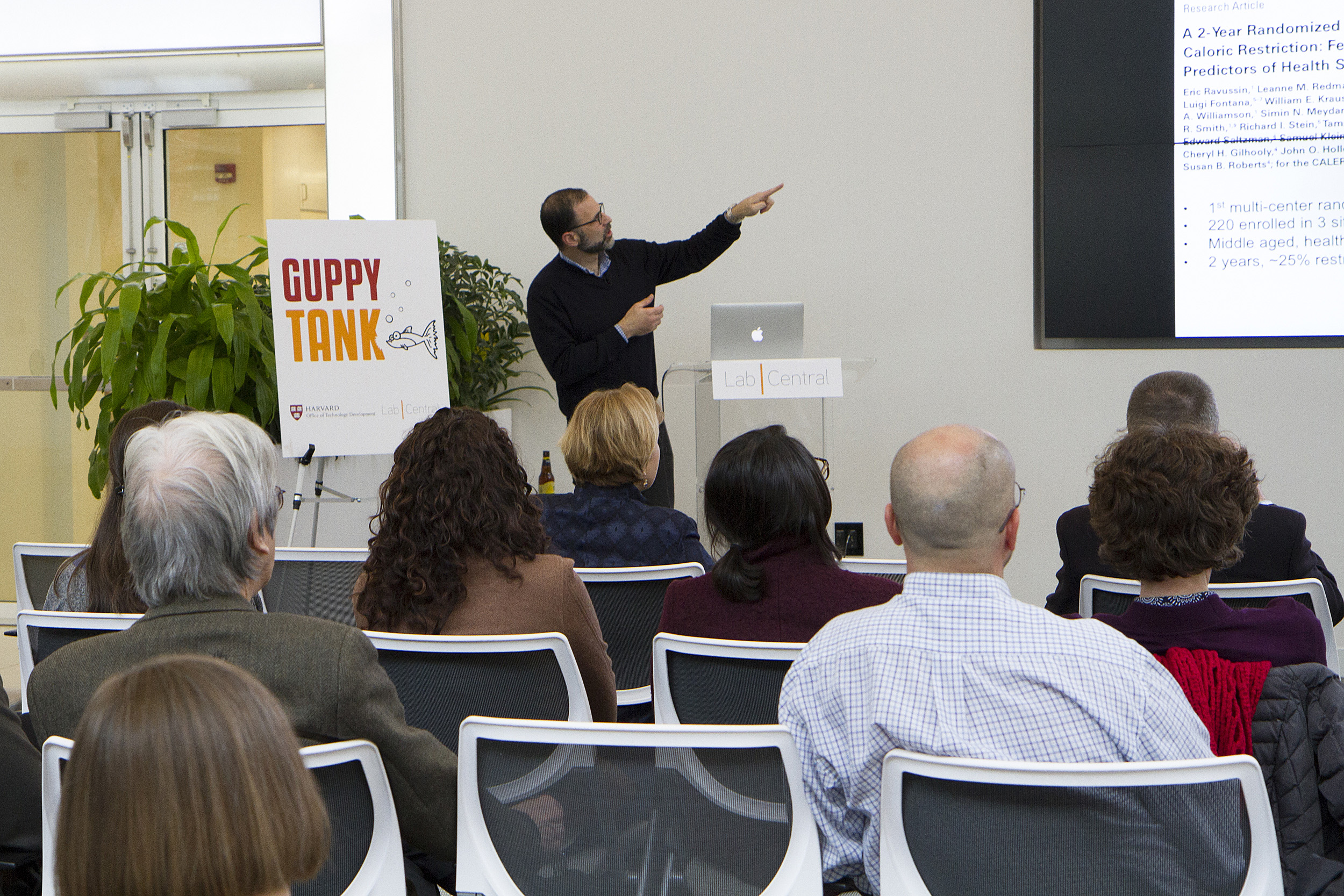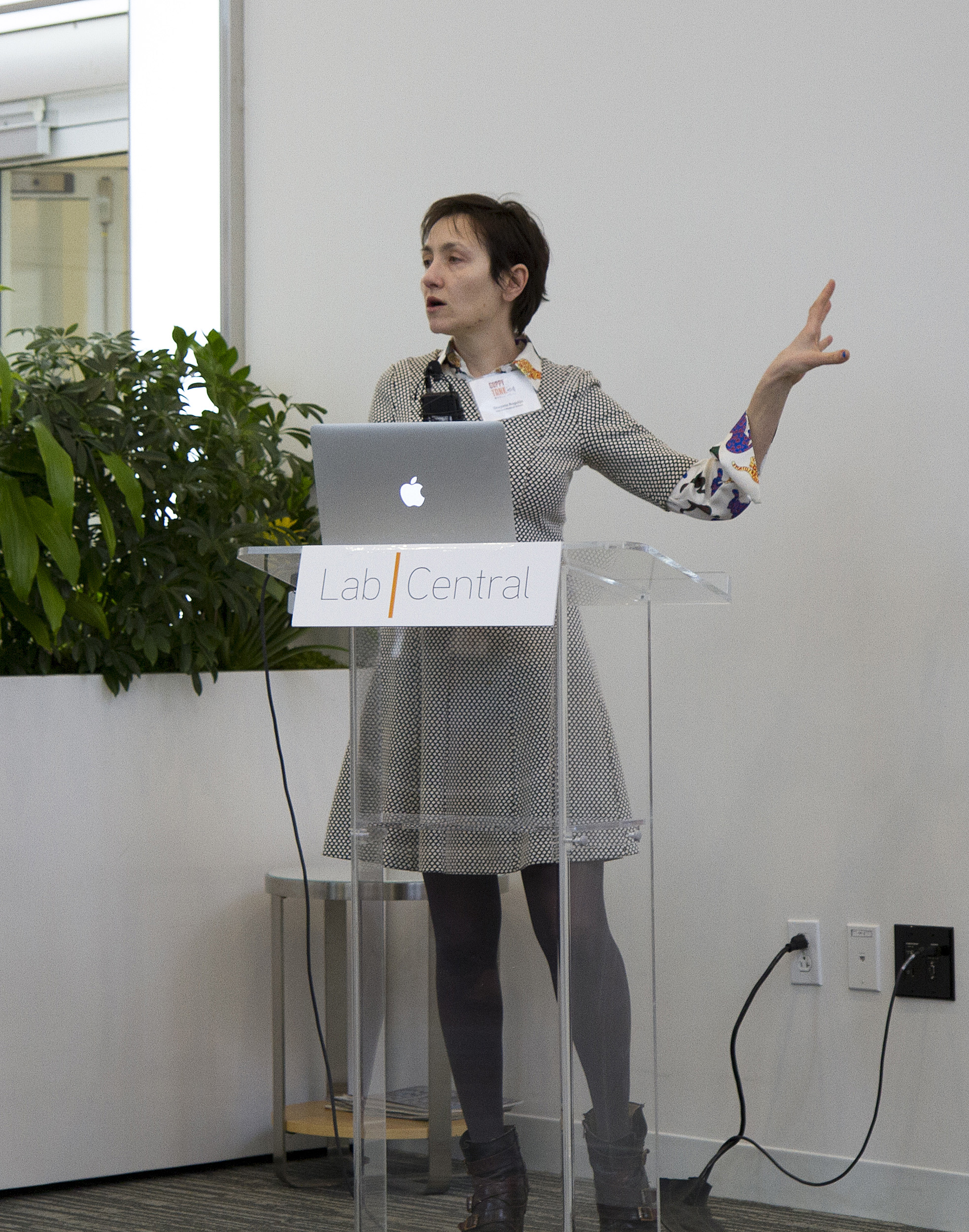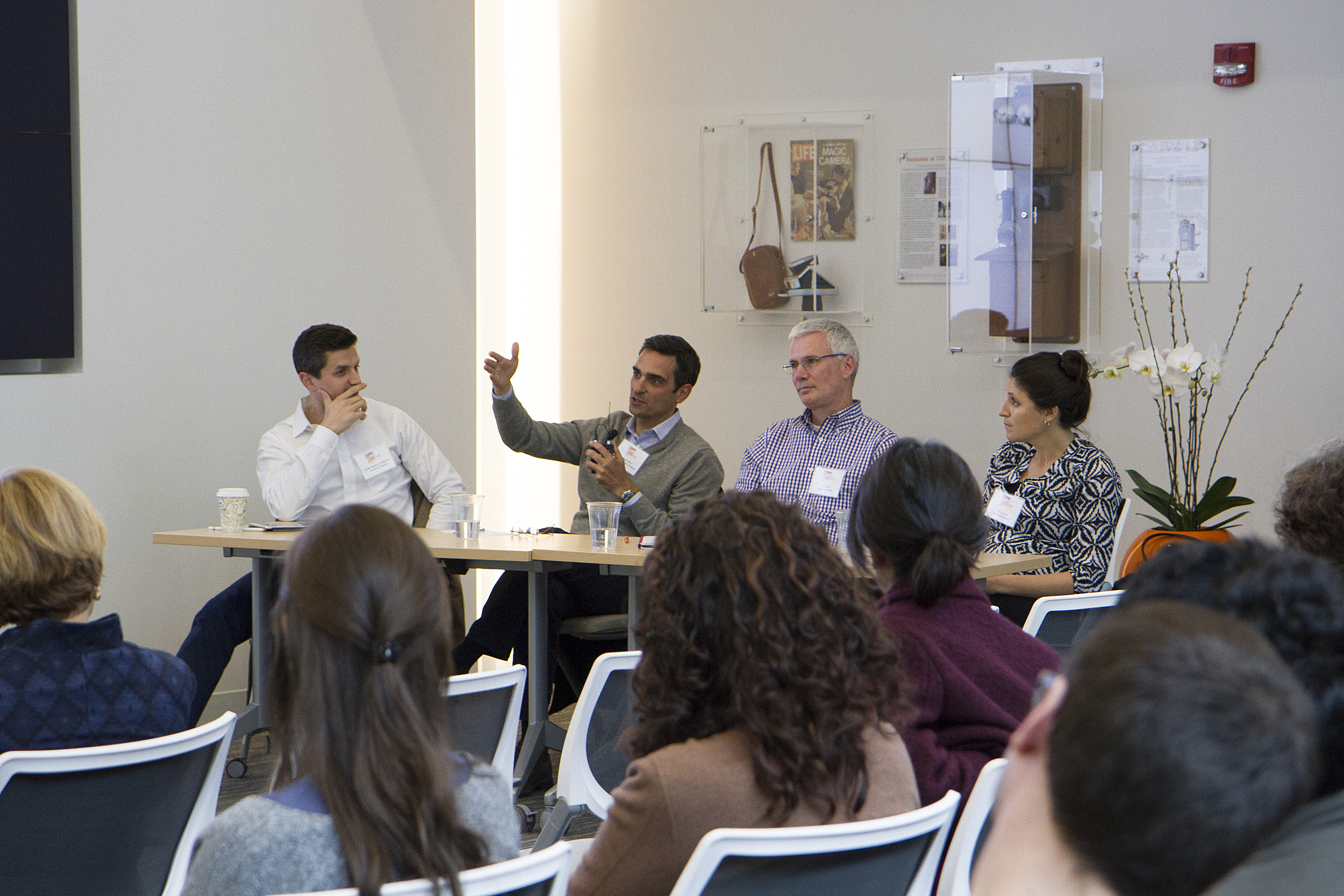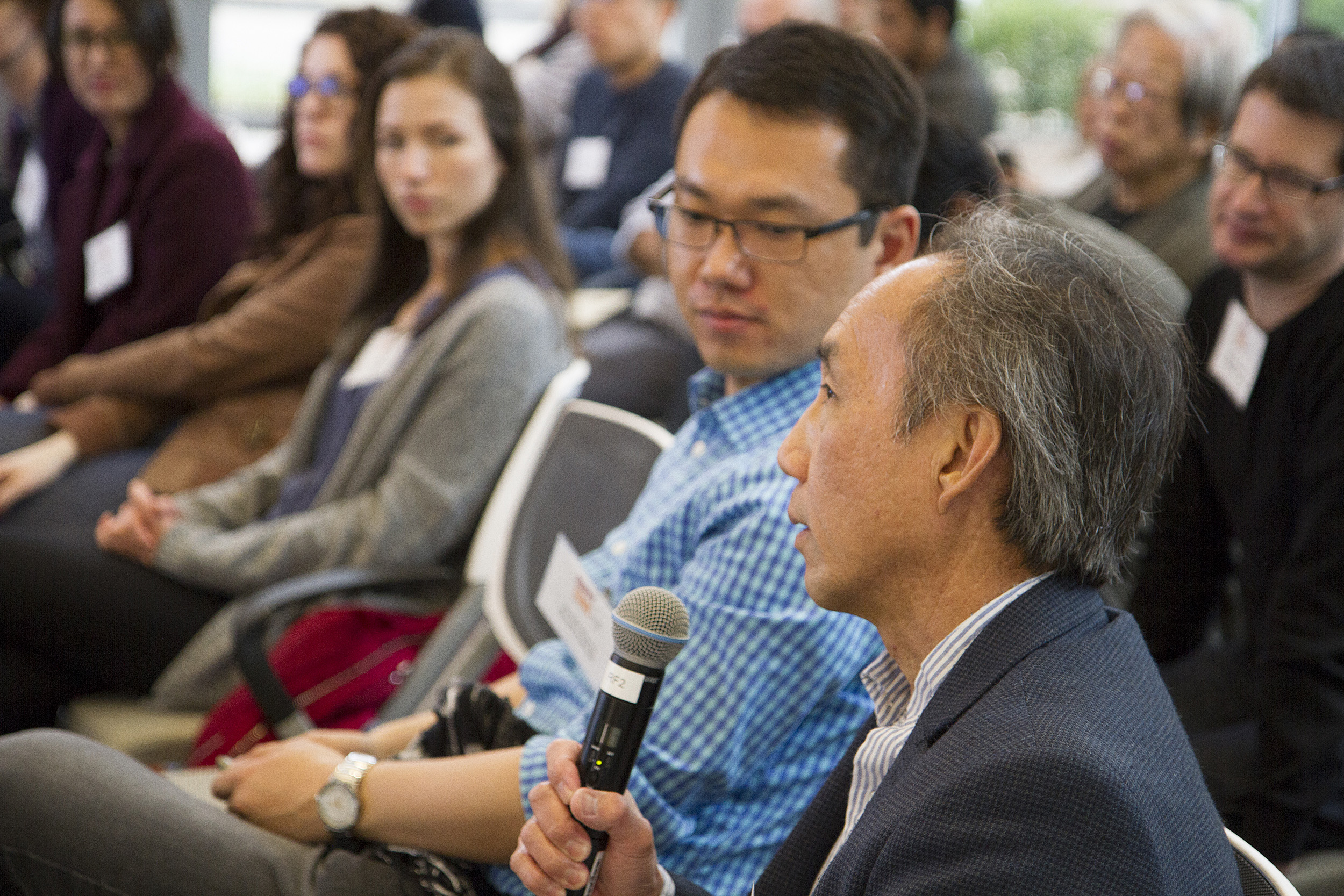
James R. Mitchell, associate professor of genetics and complex diseases at HSPH, presents on dietary restriction at Guppy Tank, where faculty get strategic guidance from a rotating panel of industry experts.
Photo by Caroline Perry
Food for thought on new ideas
At Guppy Tank sessions, Harvard researchers get guidance from big fish
Anyone who has been on a diet can vouch for how hard it can be to cut down on calories. The good news from James R. Mitchell is that isn’t the only path to better health and fitness.
Mitchell, an associate professor in the Department of Genetics and Complex Diseases at the Harvard T.H. Chan School of Public Health, has extensively researched dietary restriction, which has been shown to improve metabolic fitness and increase stress resistance in humans, as well as extend lifespan in other species. By reducing intake of protein and essential amino acids instead of calories, he says, one can reap the benefits of calorie restriction and still eat well.
Mitchell and his research team are working on applications of two low-protein diets: one is a presurgical diet to bolster a patient’s metabolic strength before a medical procedure, the other a long-term diet to improve metabolic fitness. He said both options are built around a healthy, fruit- and vegetable-based, low-protein diet, but served up in ways that retain their appeal to consumers over time.
Mitchell presented his work at the recent Guppy Tank event, the 11th in a series of Office of Technology Development presentation-and-networking sessions intended to gather feedback and encouragement for Harvard researchers’ works-in-progress.
Loosely patterned on television’s “Shark Tank” and hosted jointly with the Cambridge biotech hub LabCentral, the Guppy Tank sessions let faculty get strategic guidance from a rotating panel of industry experts — and sometimes find supporters or collaborators.
Grant Zimmermann, director of business development at OTD, said the series is designed for projects at an early stage. “It’s more a conversation than a formal presentation,” he said. “Most valuable, for our innovation teams, is the opportunity to validate the direction they’re taking in their translational research.”

Mitchell’s project was paired with a talk by Dragana Rogulja, assistant neurobiology professor at Harvard Medical School, and Alexandra Vaccaro, a postdoctoral fellow in her lab. Rogulja and Vaccaro are advancing research to offset the health effects of sleep deprivation. Together, the projects re-examine two of the most basic human needs: food and sleep.
Mitchell began on Monday by citing studies performed in mice, suggesting that protein restriction can promote longevity as reliably as calorie restriction can. Further, he suggested that the benefits of an altered diet begin to show themselves almost immediately, not over time as is often believed.
In addition to the presentation, he had questions for the panel: whether to develop the presurgical supplement or the long-term diet; whether the resulting product should be a naturally-sourced food or a processed shake; and which benefits — longevity, weight loss, better endurance — would have the most consumer appeal.
The panelists had both support and strategic questions. Joao Siffert, the chief scientific and medical officer of Nestle Health Sciences, said his company already markets pre- and post-surgery food supplements. While these offer health benefits, he said, they don’t sell especially well, because surgeons don’t tend to talk much to patients about diet. (Siffert and Mitchell continued the conversation after the session. The Nestle product is mainly recommended for a particular gastrointestinal operation, so they discussed the potential for a supplement with broader applications.)
Mitchell said afterward that the feedback represented a step forward for both his presurgical and long-term diets. “The take-home for me is that there is interest in developing these products,” he said. “There is a clinical need, and it remains a challenge how best to answer it; it’s really about translation.
“In the area of a preoperative diet, I wanted to see if there was commercial potential, and I believe there is,” Mitchell said. Likewise, he sensed interest in a consumer diet food that would target proteins. “What’s clear to me is that people eat more protein than they need. Reducing calories is beneficial, but when you reduce protein and amino acids, you activate some of these same beneficial pathways.”


Guppy Tank panelists Aleks Radovic-Moreno (from left), Joao Siffert, Jim Ellis, and Olivia Lew respond to a question from entrepreneur and investor Dominic Tong.
Photos by Caroline Perry
Another idea he is now considering more seriously is developing pet food. “Our pets share our metabolism, by and large, and have already been shown to benefit from a reduction in total protein in their diet,” he said.
Rogulja said that she likewise received useful feedback on her talk with Vaccaro, titled “I Don’t Want to Go to Sleep!” Acknowledging that she herself doesn’t like sleeping, Rogulja said nobody fully understands, at a biological level, why sleep is necessary. She and Vaccaro said new studies are looking into the biological effects of sleep deprivation, using as models fruit flies, which, like humans (and unlike mice), are diurnal and tend to make up for a lost night of sleep with naps the next day.
Rogulja and Vaccaro suggested that with the right nutritional supplements, the negative health effects of sleep deprivation might be counteracted in people who either suffer insomnia or simply prefer to sleep less.
Along with the panel of experts — who also included General Catalyst investor Olivia Lew, Puretech Health VP Aleks Radovic-Moreno, and Carica Health scientific officer James Ellis — the event drew an audience of professionals and Harvard students, who were allowed time for questions.
“The audience has the opportunity to get a vignette of some very early, but quite revolutionary concepts that are emerging from research at Harvard,” said OTD Executive Director Michal Preminger. “In contrast to a ‘Shark Tank’ setting, in which innovators are restricted to pitching the technological and commercial strengths of their programs, at Guppy Tank the interaction between Harvard innovators and the external community takes place in an open, conversational, and friendly environment. Our innovators are able to ask the most sensitive questions, share their dilemmas and concerns, and discuss not just the merits of their ideas, but also the wrinkles and limitations.”
There are business advantage as well, she said.
“I believe that leaving the Guppy Tank, our innovation teams are equipped with input that will help them advance their nascent technologies toward commercialization with a more well-informed and practical approach. It seems they have also made some connections that are likely to develop into ongoing mentoring relationships, or even concrete partnering opportunities for the technologies.”





